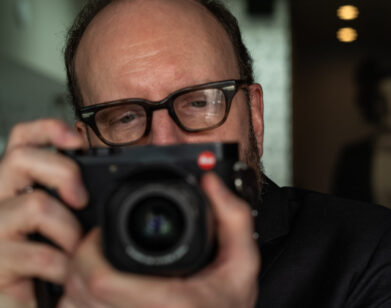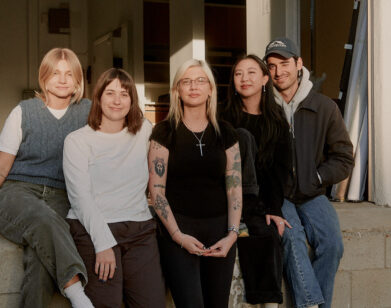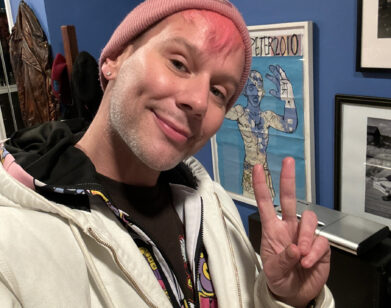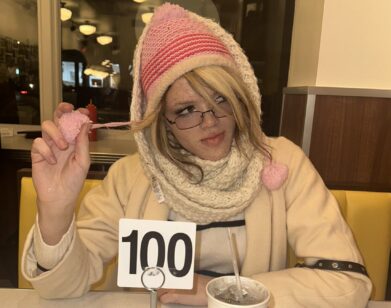Kings of Comedy: Jason Mantzoukas by Nick Offerman
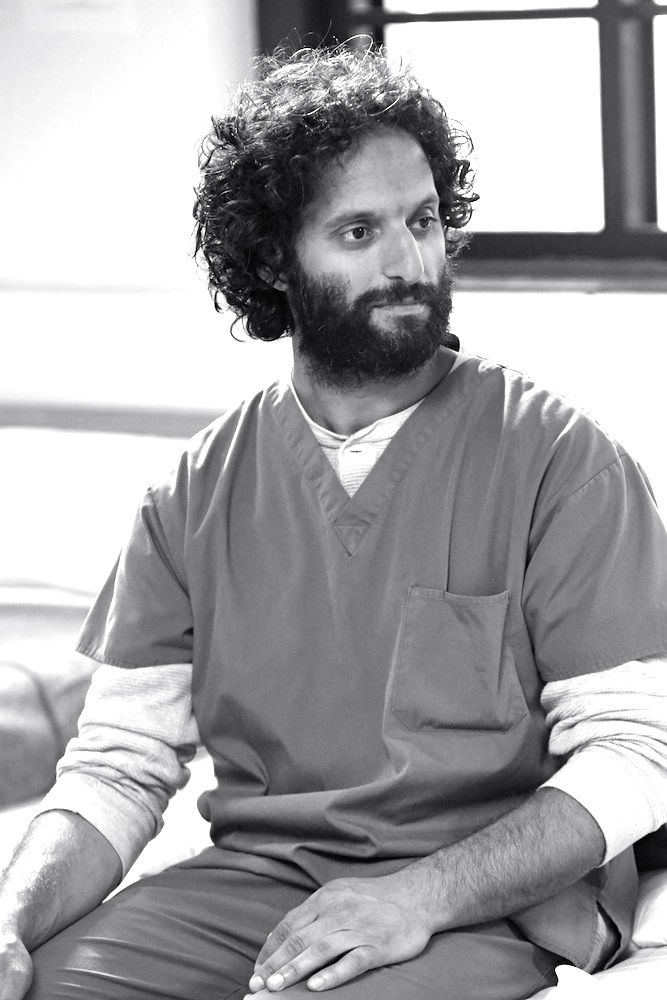
ABOVE: JASON MANTZOUKAS AS RAFI IN THE LEAGUE. PHOTO COURTESY OF FX.
If you watch The League, you know Jason Mantzoukas as Rafi, the unhinged brother-in-law of Nick Kroll’s Ruxin whose gleeful lecherousness knows no bounds. Rafi is the sort of character who could make bitches-‘n’-hoes rappers blush. He inspires YouTube “Best Of” mashups and, despite not being a series regular, gets the odd episode entirely devoted to his escapades with “Dirty Randy,” a guest character played by Seth Rogan.
Outside of The League, Mantzoukas has an active career acting on television (he recently appeared in an episode of the runaway Amazon hit Transparent and played “the fragrance kind of Pawnee” on NBC’s Parks and Recreation) and in films (Neighbors, 2014; The Dicator, 2012; They Came Together, 2014). He also writes, creating scripts for blockbuster movies like the Ice Cube/Kevin Hart comedy Ride Along (2014), as well as for cult comedy television favorites like Rob Corddry’s Children’s Hospital and his own original television pilots.
Here, Mantzoukas is interviewed by his old friend and Parks and Recreation coworker Nick Offerman.
EMMA BROWN: Hi Jason. This is Emma from Interview. Nick’s here.
JASON MANTZOUKAS: Oh, brother. Great.
NICK OFFERMAN: How do we know it’s really him?
MANTZOUKAS: [laughs] I don’t know. How do we verify this?
OFFERMAN: If I were you, I would hire a comedy writer to do this interview for you.
MANTZOUKAS: How dare you! I’m now treating this as a hostile interview. Where are you by the way?
OFFERMAN: I’m driving to Chicago from a gig in Madison last night.
MANTZOUKAS: Oh nice. How was it?
OFFERMAN: It was a lot of fun. They always let me finish my material, which I take as a great compliment.
MANTZOUKAS: You mean they don’t riot with excitement so that you never get through it?
OFFERMAN: Not yet, but I’m learning.
MANTZOUKAS: I feel like you haven’t really arrived until the comedy club riots.
OFFERMAN: Well, I have to pay my dues. I’m a young man. But enough about me. Let’s start this interview off properly…What is your problem?
MANTZOUKAS: [laughs] What is my problem?! Is this a philosophical interview?
OFFERMAN: I’ve known you for probably eight years or so. When I first met you, it was the first time I came and did the show ASSSSCAT at the Upright Citizens Brigade Theatre in New York, and my first impression of you was as an absolute wizard of improv comedy. I was quite blown away by your super heroic skills for making up hilarious scenarios and dialogue. What was your first impression of me?
MANTZOUKAS: My first impression of you was that same night. This was before Parks and Rec, this was before I knew you from any of your work. You were introduced—Amy [Poehler] knew you from Chicago. You guys had met in Chicago and you were going to do a monologue that night. The ASSSSCAT show was predicated on someone telling real stories, real stories, and then the improvisers take those stories and blow them out into improv scenes that are inspired by those stories. A lot of times, the people that do the show, that do monologues, are other comedy people who tell [stories] about the same kind of familiar territory of the improv and stand up comedy world: we’re all nerds, we had trouble getting girls and guys. A lot of stuff that is living in the realm of what we all have experienced collectively. And you came in and told a bunch of stories that were each so varied in its hilariousness and specificity. Like the story where you ran for five miles in the middle of the night to have sex with a girl in a barn.
OFFERMAN: [laughs] That’s right.
MANTZOUKAS: And then in the same show you told a story about touring Japan doing Kabuki theater. All of the stories were so varied and so amazing. I felt like, “I need to know this person because his life is fascinating.”
OFFERMAN: Well, I can’t believe that you remember those. That’s fascinating. And I was hoping to score some compliments with that question.
MANTZOUKAS: I feel like we kind of fell in love with one another at that show.
OFFERMAN: I think so. I definitely had a very powerful professional attraction to you and your comedy stylings, and I had been very ignorant of the whole world of improv comedy theaters and sketch comedy. It was like having never heard of the Harlem Globetrotters and being pitched as a kid, “Hey, you wanna see some basketball?” And it’s the Harlem Globetrotters and you’re like…[laughs] It was just mind blowing. When you were young in the Boston area—is there a more specific community you’d like to cite?
MANTZOUKAS: Oh, I grew up in Nahant, Massachusetts, which is, I believe, the smallest town in Massachusetts. It’s a one-square-mile island off the coast of Lynn, Massachusetts that’s connected by a causeway. So I grew up in a very Norman Rockwell-y New England town.
OFFERMAN: That’s funny to imagine you, because that sounds like a conservative picture.
MANTZOUKAS: Yeah. Very WASP-y, beautiful. Almost a step-back-in-time kind of town.
OFFERMAN: Were you a class clown when you were a kid?
MANTZOUKAS: Yeah, I was definitely a class clown. I feel like there are two types of class clowns. There are the class clowns that are disruptive and the kids laugh and you earn the teacher’s disdain, [but] I was the kind of class clown that also cracked the teacher up. I was funny in a way that was not dissing the teacher; I was funny just to be funny. A real charmer, with a prominent mustache that he didn’t know what to do with and a smart-alecky attitude.
OFFERMAN: And at that time you were a drummer. Is that correct?
MANTZOUKAS: Yeah, I played drums. I was in band. I was in the school band and a rock-‘n’-roll band.
OFFERMAN: What kind of music did you like to play?
MANTZOUKAS: In the beginning, the bands that we loved. I was in band that played mostly covers for a while, and the bands that we would cover were like the alternative rock bands of that day: we did a Jane’s Addiction song and a Faith No More song. All the kind of alternative radio of that time, the late ’80s, basically.
OFFERMAN: So you played kickass music?
MANTZOUKAS: We played kickass rock-‘n’-roll. Then, as it went on, I got very into playing jazz because I studied with this teacher who was a jazz drummer who was amazing. I became very obsessed with that, which led to the real obsession with improvising. I was also obsessed with comedy, so the idea that there was a version of comedy that was also improvising was very attractive.
OFFERMAN: You’ve said to me very often that you made the transition from jazz to word jazz.
MANTZOUKAS: [laughs] Yeah, you know I say that all the time! Word jazz!
OFFERMAN: What was the transition? When and how did you get off the drums and into the world of comedy?
MANTZOUKAS: In college, I pretty much did both. I was in a couple different jazz bands and then I also joined my college’s improv group. As all college groups need to have a pun-filled name, ours was the Otter Nonsense Players. That opposed the stuff we do at UCB Theatre, which is long-form improvisation where you get one suggestion—or, like in the ASSSSCAT scenario, you tell a story—and then we’ll improvise for 35, 40 minutes. The kind of stuff we did in college was more like Whose Line Is It Anyway?—short-form improv, games, stuff like that. I was a little bit more quick-paced and joke-oriented. So I joined that group, which featured me; Jessica St. Clair, who’s now on that show Playing House on USA; Rodney Rothman, who wrote 22 Jump Street and is a big writer-producer for a lot of Judd Apatow movies and Nick Stoller movies; and a bunch of other great people. We started doing long-form stuff because Rodney went to New York one summer and got the book Truth in Comedy, which explained how to do long-form improv. From that book we tried to do it and were terrible at it.
OFFERMAN: I didn’t realize you knew Jessica that long.
MANTZOUKAS: Oh, yeah. She’s younger than me, but we overlapped for two years. Her husband Dan O’Brien, who’s a huge playwright, was in that group as well.
OFFERMAN: He’s overweight?
MANTZOUKAS: Yeah, he’s a huge playwright. Like a 500-pound playwright. [laughs] I’m just kidding. He’s a very svelte man.
OFFERMAN: So it’s been said that the peak of your career was a certain night in New York when you took on the daring prospect of a two man improv show, which everyone knows takes the utmost of balls. I can’t remember, was the group called Mansofferman or Offermantzoukas?
MANTZOUKAS: That’s a good question. We toyed with both of them. I think it was Offermantzoukas, because we decided that was both of our entire names.
OFFERMAN: That’s more salient. Do you feel like you’ve done, in all of your career, better improv scenes than we achieved that evening?
MANTZOUKAS: Let me be honest with you, and I really want to be clear that this is probably the most important part of the interview. This was 15 minutes of the greatest comedy that’s ever been performed on a Wednesday night at 11:30 PM.
OFFERMAN: Yeah, they’re still trying to recreate it.
MANTZOUKAS: People died in the audience because it was so funny. That was a very fun night.
OFFERMAN: It was incredibly fun. To go back to my basketball analogy, it was the equivalent of watching the Chicago Bulls of the mid-’90s and saying, “Man, I’d love to shoot some hoops with you guys,” having them say, “Come on in, we’ll put you in as forward,” and suddenly realizing that I was not a professional basketball player by any stretch.
MANTZOUKAS: I felt like it was pretty much seamless. You were present. Improv is not hard. You just have to be present and listen, and you were able to do both. And we both won Tony’s for it.
OFFERMAN: That’s true. I was also nominated for a Lucille Lortel [Award].
MANTZOUKAS: Oh wow. I forgot about that.
OFFERMAN: [I lost to] Neil Patrick Harris for his night of improv with John Leguizamo, in which they played 37 characters. You can’t go up against that firepower.
MANTZOUKAS: Oh, are you kidding? Leguizarris? Leguizarris is the best improv group in town.
OFFERMAN: Once he gets into his older relatives, the game was over. His grandpoppy, forget about it.
MANTZOUKAS: Oh yeah. And we’re talking about Neil Patrick Harris’s grandpoppy.
OFFERMAN: So you became one of the foundational pillars of the Upright Citizens Brigade, sort of the master group. Part of my fascination I think is easily understood in the fact that I stumbled in there right when the first great old school group was at their peak. Because shortly thereafter, almost the entire group of talent moved to Los Angeles to work on bigger and better and more lucrative opportunities. What was that like for you? You’re considered one of the old master Jedis of a nationally leading improv theater company. What was the transition like going to Hollywood and having to ply your wares where UCB was not nearly as established?
MANTZOUKAS: It was interesting. I started in ’98 at UCB, before there was a theater when it was just the Upright Citizens Brigade—Amy [Poehler], Matt [Besser] and Ian [Roberts]—that would teach classes all over town at different rehearsal spaces and then perform at different venues. The group that I came in around was all the people you’re talking about: Rob Corddry, Paul Scheer, Rob Huebel. [Ed] Helms was in there and [Rob] Riggle, and all these great people. And you’re right, you were there at a time when a bunch of people had moved to L.A. Once I had agents and so forth, I would go to L.A. for pilot season and there was zero awareness of UCB. People would see UCB on my résumé and think it meant University of California Berkeley, because there was no UCB Theater in L.A. It had no presence here. This went on for years. The real game changer, I feel like, was twofold: they opened a UCB Theatre in L.A. and suddenly that became a real hub for all of these incredibly talented people, and a lot of those people started being used in very prominent roles in TV and movies. A bunch of movies came out where improv was integral to the development of the movies themselves, and once [Adam] McKay and [Will] Ferrell were making those movies that had a lot of improvisation, once Judd [Apatow] and [Seth] Rogan were making movies that had a lot of improvisation, suddenly there was a demand for people who could improvise. And there was this whole class of people who had been already trained for this skill set. So suddenly everybody got gobbled up, which was great.
OFFERMAN: It also coincided with the later years of The Office and the first years of Parks and Rec, where it became clear that the UCB was the perfect farm for all of the guest actors on our shows. It was astonishing. Like I’d go to shows the L.A. UCB and just see all of these people that I enjoyed in recent comedies. Someone is just showing up here and picking all the fruit off this delicious tree.
MANTZOUKAS: The show that I’m now on, The League, is its sixth season, and the show is completely improvised. They write a script that has no dialogue in it—it’s just story beats. Curb Your Enthusiasm was done the same way. What they did was just cast all great improvisers. The Schaffers, who created the show, would very publicly come and watch shows at UCB and look for people. UCB’s point of view is very naturalistic. It’s not super broad; it’s not very big characters—the ability to improvise is in a real world scenario. It’s not like every improv scene is, “I’m a robot and you’re a pirate. ‘ere we are, hurtling in this space shuttle.” Everything is much more grounded and relatable, which I think made everyone good actors as well, so we could step into TV shows and not seem like lunatics. Unless they need us to be lunatics, which often times, they apparently need me to be.
OFFERMAN: That’s a nice segue to your character Rafi on the much heralded program The League. A character that I think was originally called Sheldon?
MANTZOUKAS: That’s true, yeah. [laughs] I don’t know why, but yes.
OFFERMAN: So was there any rhyme or reason to change from Sheldon to Rafi?
MANTZOUKAS: The Schaffers approached me to come in and play this character, which was just supposed to be for a couple of episodes. They had the story line worked out: in order to curry favor for his wife, Nick Kroll’s character gets her brother into the league, but then everybody hates the guy, so they kick him out. To their credit, the Schaffers were like, “What version of a horrible guy do you want to be? How do you want to do it?” I was like, “Ooh! I know exactly what I want to do. I feel like what this show lacks is a real maniac. I want to do a lovable maniac.” And I had been performing some version of lovable maniac in improv scenes and other things, so I knew the direction I wanted to go in, which was someone who is completely, all unbridled id. No filter; no nothing. He’s kind of a monster, but also that lack of filter causes him to love everybody. He just gives into all emotions. So that love for absolutely super fucked up sex and violence also means he gets emotionally very invested in the friendships with the guys in the league, who hate him.
OFFERMAN: Something I love about Rafi is that you seem to keep raising the bar. As the character’s life continues, he becomes more of a maniac. I’m curious if there’s a line that you would draw. Is there something Rafi would not do?
MANTZOUKAS: I don’t think so. Just to list off some of the things he’s done: he’s for sure murdered people, he is a pornographer using homeless people and mentally ill people, he walked around after 9/11 in a fireman’s uniform just to get pussy, he believes motorcycle helmets are ridiculous, he is engaged clearly with some sort of incestuous relationship with his sister. I don’t know where that line is…
OFFERMAN: His moral compass has no needle in it.
MANTZOUKAS: It really doesn’t. He’s up for anything and is very committed to vigilante justice, hyper violence. I feel like he’s prepared for an end of days scenario and would thrive in it.
OFFERMAN: I’d love to consider a Showtime miniseries where Ron Swanson and Rafi end up in a survivalist situation. Or True Detective Season Three.
MANTZOUKAS: Now we’re talking. I feel like there’s definitely a story to be told about Ron Swanson and Rafi having the same bug-out location— the same bunker that they’ve filled with stuff. I also like the True Detective Season Three idea. I would love to see Ron Swanson and Rafi try to solve a crime.
OFFERMAN: You’re also a pretty prolific, incredibly hilarious writer of both television and screenplays. I was quite invested in the fate of a series that you sold to Fox when you first moved to town, your cop show Off Duty, and your hand of an assfucking in that situation, but I feel like it led to some great opportunities. You’ve gotten to write some pretty cool stuff.
MANTZOUKAS: Yeah. I wrote this show called Off Duty for NBC. We shot this great pilot in New York with Bradley Whitford and Romany Malco as the stars. It felt like a cable show; it was very crass, loud, and dirty police half-hour. The only thing I set out to do was a police show where you never see them investigate a crime. It’s all the time they spend together off duty or around the police precinct, just bullshitting their lives. It came out great. Everyone was really excited by it and it was definitely one of those Hollywood stories where it started to get such word of mouth. The network was really high on it: “You should start interviewing writers.” We went down the road and we started talking to writers. We were really excited. And then it didn’t get picked up and it all fell apart. Then it looked like it was going to go to a different network and that didn’t happen. But even though it was truly a heartbreaking journey to not getting picked up, it had such reach in terms of people being like, “Oh my god, you’re the guy who wrote Off Duty? Holy shit I loved that show,” that it got me a lot of stuff. That’s how I came to write that Ice Cube movie Ride Along. I wrote a show for Fox because of Off Duty that didn’t wind up getting made. I wound up getting a lot of work just on how loved that pilot was, even though it was never shown on the air, which is pretty great.
OFFERMAN: It’s funny, going through pilot season and television work myself for 16 or 17 years, isn’t it strange how every year it seems like you can tell if a pilot is too good, it’s not going to fly.
MANTZOUKAS: Did you guys feel like you were insulated from that kind of drama at Parks because you had Mike [Schur] and Greg [Daniels] and all these great people coming out of The Office?
OFFERMAN: Certainly in some ways the clout of The Office and the way that Greg had taken this excellent established British series and spun it into his own sort of pastiche with great success, that gave us a lot of leeway to begin our show by our own rules. Also the incredible firepower that Amy brings to the table, played a big part. I think we were able to start completely on our own terms and then it fell into some of the strange pattern where I think we actually suffered a lot because of the success of The Office. I feel like even these days, years later, people will say to me, “I’m a huge fan of comedy, but I loved The Office, so I never watch Parks and Rec.” And I’ll say, “Well, maybe you’re dumb.”
MANTZOUKAS: [laughs]
OFFERMAN: It seems to me you would at least give it a chance. Once we made our first six-episode pilot we were in it. We were in the business and suddenly we were susceptible to the ratings and public opinion. And that’s why we felt incredible lucky that we came back after that first six episodes because I think we were very much on the bubble.
MANTZOUKAS: For sure. Just knowing you during that time, there was such a back and forth about you getting on that show, and once it hit, you exploded. Ron Swanson became a real movement, which was very satisfying to watch.
OFFERMAN: Yeah it was pretty fascinating, being a pretty strange character actor.
MANTZOUKAS: A very strange character actor.
OFFERMAN: Thank you for qualifying that.
MANTZOUKAS: I don’t know if a lot of people know this, but if you want to see Nick Offerman’s dick on screen you can watch the television show Deadwood on HBO. Am I correct—you are featured naked on that show?
OFFERMAN: That is relatively accurate. I think I have a Union suit around my ankles and a pretty solid layer of mud on my entire person. And since you’ve gone to the trouble of pointing us in that direction, I will mention that we did two takes of that scene and the other take was about 5/8 of an inch better. There was a problem with the sound.
MANTZOUKAS: Ah, that’s heartbreaking. But there are going to be a lot of people who read this that are going to rush right out just to see Ron Swanson’s dick, really.
OFFERMAN: I imagine we’ll see an uptake in DVD sales.
MANTZOUKAS: Do yourself a favor, everybody, and watch the whole series. It’s really terrific.
OFFERMAN: It is. There are few better. We’re both at the estimable United Talent Agency. We share some agents with whom we’re deeply enamored and every time I have an idea that I want to develop and I ask our agents, “Can I see if Jason can do this?” they, like stern parents, say, “No, Jason won’t be coming out to play for quite some time. He has a lot of homework to finish.” I’m aware that you always have a few different hats to wear as a writer besides all the acting work you’re doing, and I’m wondering what you’ve recently written or what you’re working on that’s got you excited?
MANTZOUKAS: Right now I’m excited about a couple of things. I’m writing a television show for Showtime that is loosely autobiographical. It’s kind of like my life as it was when I met you in New York. At that time I had just gotten out of a 10-year relationship and was trying to figure out just how to exist in the world. Something that is in the complete opposite direction, Rob Corddry and our friends Jesse Falcon and Brian Huskey are writing a pilot for Adult Swim that is in that same kind of absurdist dark world [as Children‘s Hospital]. I don’t want to say too much about it, but it’s basically the most fucked up children’s show you can imagine.
OFFERMAN: That’s the first I’m hearing of that and that’s titillating.
MANTZOUKAS: And it stars Huskey, in his most Huskey, deranged, impotent-rage persona.
OFFERMAN: There’s just nobody that does pederast like that guy. He’s got the goods.
MANTZOUKAS: [laughs] That’s the pull-quote for Huskey. I’m pretty excited about that. And I wrote a movie last year that I’m trying to put together now to direct next year. But if you want to work on a project, let’s do it. What do you want do?
OFFERMAN: Well there’s a few things that I’m going to need your assistance with.
MANTZOUKAS: Happily.
OFFERMAN: I’m afraid even mentioning them publicly. They’re very ripe for theft.
MANTZOUKAS: Of course. We’ll talk about them over a steak.
OFFERMAN: One is a serial killer masseuse.
MANTZOUKAS: Is it called Rubbed Down/Rubbed Out?
OFFERMAN: [laughs] That’s what I’m talking about.
MANTZOUKAS: I’m already at work.
THE LEAGUE IS CURRENTLY IN ITS SIXTH SEASON AND AIRS WEDNESDAYS ON FXX.


